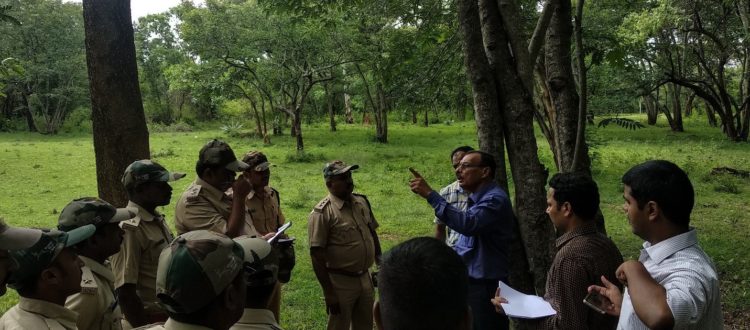Strengthening wildlife enforcement in the land of Veerappan
My two accompanies on the way to Biligiri Rangaswamy Temple Tiger Reserve from Coimbatore were my driver Sundara Pandi and his stories of a man named Muniswamy Goulder. The main focus of his stories was around the illegal activities carried out by Muniswamy in the forest ranges of Sathyamangalam to BRT Sanctuary. I was surprised to learn the incidents of him hunting elephants for their tusks and smuggling sandalwood out of forests that later earned him the nickname of Sandalwood Veerappan. One can only imagine the difficulties the department would have faced while trying to crack the network and attempts of illegal activities he would have carried during his times.
It has been more than 15 years since the notorious Veerappan was finally killed and his bloodied trail of wildlife crimes came to an end. But ever since then, illegal wildlife trade has evolved into a more organized form, thus becoming more challenging for the forest officials and frontline staff.
[acx_slideshow name=”brt”]
BRT tiger reserve acts a crucial biological bridge that links the Eastern Ghats to the Western Ghats, hence allowing unhindered movement of wild animals in between the ranges. Formed in 2011, the tiger reserve got its name after the white rock (Biligiri in Kannada) that constitutes the significant hill that has the famous temple of Lord Ranganathaswamy. It is recognized as a vital tiger habitat and wildlife corridor. Dominated by tropical dry broadleaf trees, the forests of BRT are conspicuously known for wild herds of elephants.
Wildlife Trust of India (WTI) in partnership with the Karnataka Forest Department and with support from Fondation SEGRE had conducted a three-day training programme to train, equip and boost the morale of frontline forest staff under its Van Rakshak Project (VRP). One can read in detail about VRP here https://www.wti.org.in/projects/wildlife-crime-control-division/
The training curriculum included legal and enforcement aspects of the Wild Life (Protection) Act, 1972, as well as wildlife crime prevention components such as the basics of anti-poaching patrolling techniques, intelligence gathering, informer network and handling, search and seizure, interrogation, hunting communities, crime scene investigation and the preparation of Preliminary Offence Reports. Trainees from the forest department were also briefed on relevant provisions of the Indian Evidence Act, Indian Penal Code and the Code of Criminal Proceedings, and the powers conferred on them therein for the prosecution of wildlife crimes.
The training programme was inaugurated by Dr. Shankar, Conservator of Forest (CF) and Field Director BRT Tiger Reserve. The first session was taken by Mr VG Bandi, Public Prosecutor (Rtd.) Sirsi, who briefed the officers on the detailed procedure as well as the nuances in criminal cases. It was followed by a practical training session conducted by Mr Sreenivas, Scientific Officer from State Forensic Science Laboratory, Bangalore, where participants were divided into several teams, and they learned about various challenges and problems along with proper procedures to be followed in case of a wildlife crime scene. Mr Srinivas also took a session on ballistics and forensics of a crime scene followed by Mr Parameshwar, Assisstant Conservator of Forests, Special Tiger Protection Force, who conducted a session on building informer network and getting relevant information to facilitate anti-poaching activities.
The training was concluded by distributing field kits and certificates to the participants and the program ended on a successful note.
WTI has been conducting such Wildlife Crime Prevention Training programme under its Van Rakshak Project (VRP) since 2001. Over 17100 frontline forest personnel have been trained in over 138 Protected Areas across 18 states. VRP follows a multi-pronged strategy with four thrust areas abbreviated as TEAM: Training, Equipping, Awareness and Morale Boosting, to build capacity and strengthen the spirit of personnel in severe field conditions.
Pikit Hembrom works as Programme Officer in the Wildlife Crime Control Division at WTI. He loves photography and has a passion for wildlife. You can reach out to him at po1.wccd@wti.org.in









